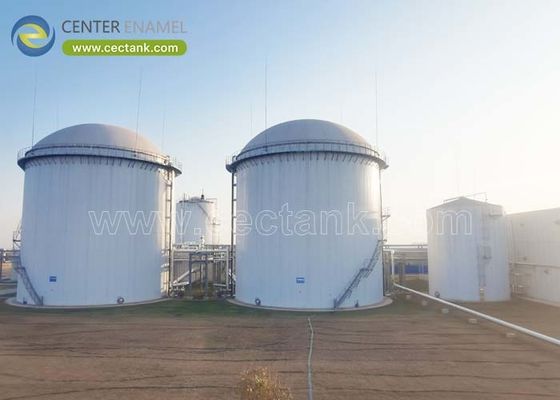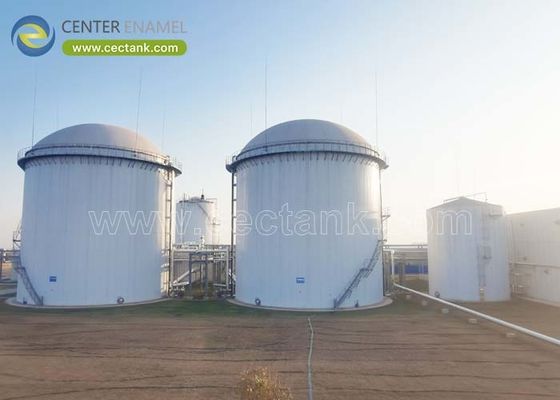-
Glass Fused To Steel Tanks (469)
-
Stainless Steel Tanks (434)
-
Fusion Bonded Epoxy Tanks (469)
-
Galvanized Steel Tanks (321)
-
Aluminum Dome Roofs (1257)
-
Wastewater Storage Tanks (226)
-
Welded Steel Tanks (457)
-
Pressure Vessels (295)
-
Anaerobic Digester (201)
-
Industrial Water Tanks (349)
-
Glass Lined Steel Tanks (180)
-
Bolted Steel Tanks (345)
-
Sludge Storage Tank (115)
-
Biogas Storage Tank (173)
-
Leachate Storage Tanks (133)
-
Agricultural Water Storage Tanks (179)
-
Fire Water Tank (166)
-
Grain Storage Silos (146)
-
Biogas Projects (381)
-
Wastewater Treatment Projects (270)
-
Double Membrane Roof (223)
Glass-Lined Steel Anaerobic Digestion Tanks: The Ultimate Solution for Efficient and Sustainable Organic Waste Treatment
| Place of Origin: | China |
| Brand Name: | CEC TANKS |
| Certification: | ISO 9001:2008, NSF - 61 , AWWA D103 , OSHA , BSCI |
| Model Number: | W20160831001 |
| Minimum Order Quantity: | 1set |
| Price: | $5000~$20000 one set |
| Packaging Details: | PE poly-foam between each two steel plates ; wooden pallet and wooden box |
| Delivery Time: | 30 days after deposit received |
| Supply Ability: | 60 sets per month |
|
Detail Information |
|||
Product Description
Glass-Lined Steel Anaerobic Digestion Tanks: The Ultimate Solution for Efficient and Sustainable Organic Waste Treatment
In today’s world, the importance of sustainable waste management practices cannot be overstated. With growing concerns about environmental pollution, resource conservation, and renewable energy, industries worldwide are turning to anaerobic digestion as an effective solution for organic waste treatment. Anaerobic digestion not only reduces waste volume but also produces valuable biogas that can be used as a renewable energy source. To maximize the efficiency and longevity of anaerobic digestion systems, the choice of tank material plays a critical role.
At Shijiazhuang Zhengzhong Technology Co., Ltd. (also known as Center Enamel), we offer Glass-Lined Steel (GLS) Anaerobic Digestion Tanks, a cutting-edge solution designed to provide optimal performance, durability, and cost-effectiveness in the harsh and demanding conditions of organic waste treatment. In this article, we’ll explore why GLS tanks are the perfect choice for anaerobic digestion processes and how they contribute to more sustainable waste-to-energy systems.
As a leading storage tanks manufacturer worldwide. Center Enamel can provide Glass-Fused-to-Steel (GFS) tanks, fusion bonded epoxy tanks, stainless steel tanks, galvanized steel tanks and aluminum geodesic dome roofs, Wastewater and Biogas Project Equipments for global customers.
| Configuration of Customized Storage Tanks | ||||
| Storage tanks | Volume | Roofs | Application | Design Requirements |
|
GFS Tanks SS Tanks Fusion Bonded Epoxy Tanks Galvanized Steel Tanks Welded Steel Tanks |
<1000m³ 1000-10000m³ 10000-20000m³ 20000-25000m³ >25000m³ |
ADR Roof GFS Roof Membrane Roof FRP Roof Trough Deck Roof |
Wastewater Treatment Project Drinking Water Project Municipal Sewage Project Biogas Project Fire Water Storage Project Oil Storage Project |
Water Supply & Drainage System Seismic Design Wind Resistant Design Lightning Protection Design Tank Insulation Design |
WasteWater Treatment Project Equipment Supply
| Pretreatment Equipment | Resource Utilization System | Sludge Treatment System | Other Equipment |
|
Mechanical Bar Screen Solid-liquid Separator Submersible Mixer |
Gas Holder Boiler System Boost Fan Biogas Generator Torch System Dehydration and Desulfurization Tank |
PAM Integration Dosing Device Screw Sludge Dewatering Machine Slurry Separation Centrifuge |
Sewage Pump Mud Scraper Submersible Sewage Pump Three-phases Separator |
What Is Anaerobic Digestion?
Anaerobic digestion is a biological process in which microorganisms break down organic materials, such as food waste, agricultural residues, and wastewater sludge, in the absence of oxygen. This process results in the production of biogas, primarily composed of methane and carbon dioxide. The biogas can then be captured and used as a renewable energy source, while the remaining organic material, called digestate, can be used as a high-quality fertilizer.
The effectiveness of anaerobic digestion largely depends on the quality and durability of the tanks used to house the digestion process. The tanks must be able to withstand corrosive substances, high-pressure conditions, and a constant need for maintenance, all while ensuring efficient gas production and minimizing energy loss.
Why Choose Glass-Lined Steel (GLS) Tanks for Anaerobic Digestion?
Superior Corrosion Resistance
One of the key challenges in anaerobic digestion is the corrosive nature of the environment inside the digester. The high levels of moisture, organic acids, and gases such as hydrogen sulfide produced during digestion can quickly degrade tanks made from conventional materials. Glass-Lined Steel (GLS) tanks, however, are coated with a layer of glass that is permanently bonded to the steel substrate, providing a highly corrosion-resistant surface.
This glass coating forms a smooth, non-porous barrier that protects the steel from corrosion, ensuring the longevity of the tank and preventing the need for frequent repairs or replacements. The glass lining also resists the buildup of sludge and biofilm, making it easier to clean and maintain the tank over time.
Exceptional Durability and Structural Strength
GLS tanks are known for their exceptional durability and ability to withstand high-pressure conditions. Anaerobic digestion tanks must endure the mechanical stresses caused by fluctuations in gas production, temperature changes, and the weight of the materials inside. The combination of steel’s strength and the protective glass lining makes GLS anaerobic digestion tanks highly resilient and able to withstand these challenges without compromising performance.
Whether used for small-scale organic waste treatment or large industrial applications, GLS tanks offer the strength required to support efficient digestion processes while maintaining their integrity over the long term.
Low Maintenance and Long Lifespan
One of the most significant advantages of GLS anaerobic digestion tanks is their low maintenance requirements. The smooth glass surface of the tank not only resists corrosion but also prevents the buildup of waste materials, which can reduce the efficiency of the digestion process and require constant cleaning. This means GLS tanks require far less maintenance than traditional steel or concrete tanks, saving both time and money on repairs and cleaning.
The glass lining also helps prevent leaks, ensuring that the biogas and liquid contents of the tank remain securely contained. With proper care, GLS anaerobic digestion tanks can last for many decades, providing a long-term, reliable solution for organic waste treatment.
Enhanced Efficiency and Performance
The unique combination of glass and steel in GLS anaerobic digestion tanks provides an optimal environment for the anaerobic digestion process. The glass lining prevents the accumulation of biological material inside the tank, which helps maintain a clean and efficient digestion environment. This results in faster breakdown of organic materials, higher biogas production, and more efficient energy recovery.
Additionally, GLS tanks are equipped with advanced sealing technology to prevent any gas leaks, ensuring that the biogas generated can be efficiently captured and utilized for energy production. This enhances the overall energy efficiency of the anaerobic digestion system, making it a more sustainable waste-to-energy solution.
Eco-Friendly Solution
At Center Enamel, we are committed to sustainability, and our Glass-Lined Steel Anaerobic Digestion Tanks are designed with the environment in mind. Not only do these tanks help reduce organic waste and generate renewable energy, but their durable and corrosion-resistant materials also ensure a long lifespan, reducing the need for frequent replacements. The glass lining used in our tanks is made from sustainable materials, and the tanks themselves are recyclable, contributing to a circular economy and minimizing environmental impact.
Customizable for Different Applications
Whether you are managing organic waste from municipal wastewater treatment plants, agricultural facilities, or food processing industries, GLS anaerobic digestion tanks can be customized to meet your specific needs. Our tanks are designed in various sizes and configurations to handle different volumes of organic waste and can be tailored with specialized accessories such as gas collection systems, temperature control units, and mixing equipment to optimize performance.
Applications of Glass-Lined Steel Anaerobic Digestion Tanks
Municipal Wastewater Treatment
GLS anaerobic digestion tanks are widely used in municipal wastewater treatment plants to process sludge and organic waste. By converting waste into biogas, these tanks help municipalities meet environmental regulations and produce renewable energy to power local infrastructure.
Agricultural Waste Management
Agriculture produces large quantities of organic waste, including animal manure, crop residues, and food processing byproducts. GLS anaerobic digestion tanks are the ideal solution for farmers and agricultural companies looking to manage waste sustainably while producing biogas and nutrient-rich digestate.
Food and Beverage Industry
The food and beverage industry generates significant amounts of organic waste, such as food scraps, oils, and residues. GLS anaerobic digestion tanks allow companies to process this waste efficiently, reducing disposal costs and producing valuable biogas.
Industrial Effluent Treatment
Many industries generate organic effluent that must be treated before being released into the environment. GLS anaerobic digestion tanks provide an effective solution for treating industrial wastewater and producing biogas while adhering to environmental standards.
Biogas Plants
GLS anaerobic digestion tanks are integral to biogas plants, where organic waste is processed to generate renewable energy. These tanks help optimize biogas production and contribute to the sustainability of the energy generation process.
Why Choose Center Enamel’s Glass-Lined Steel Anaerobic Digestion Tanks?
At Center Enamel, we pride ourselves on providing high-quality, durable, and efficient solutions for anaerobic digestion systems. Our Glass-Lined Steel (GLS) anaerobic digestion tanks offer:
Long-lasting durability with superior corrosion resistance.
Efficient waste-to-energy conversion through enhanced biogas production.
Low maintenance costs and minimal downtime.
Customizable designs to suit a wide range of applications.
Eco-friendly features that support sustainability goals.
With over 30 years of experience in the tank manufacturing industry and a global presence in over 90 countries, Center Enamel is a trusted provider of Glass-Lined Steel Anaerobic Digestion Tanks. Our tanks are engineered to meet the highest international standards and designed to deliver reliable, long-term performance.
Glass-Lined Steel Anaerobic Digestion Tanks offer an exceptional solution for efficiently processing organic waste, generating biogas, and contributing to sustainable waste management practices. Their corrosion resistance, durability, low maintenance requirements, and long lifespan make them the ideal choice for anaerobic digestion systems across a variety of industries.
At Center Enamel, we are committed to helping businesses and municipalities achieve their waste-to-energy goals with high-performance, cost-effective GLS anaerobic digestion tanks. To learn more about our products and how they can optimize your anaerobic digestion process, contact us today. Let us help you transform waste into a renewable energy source for a greener, more sustainable future.




